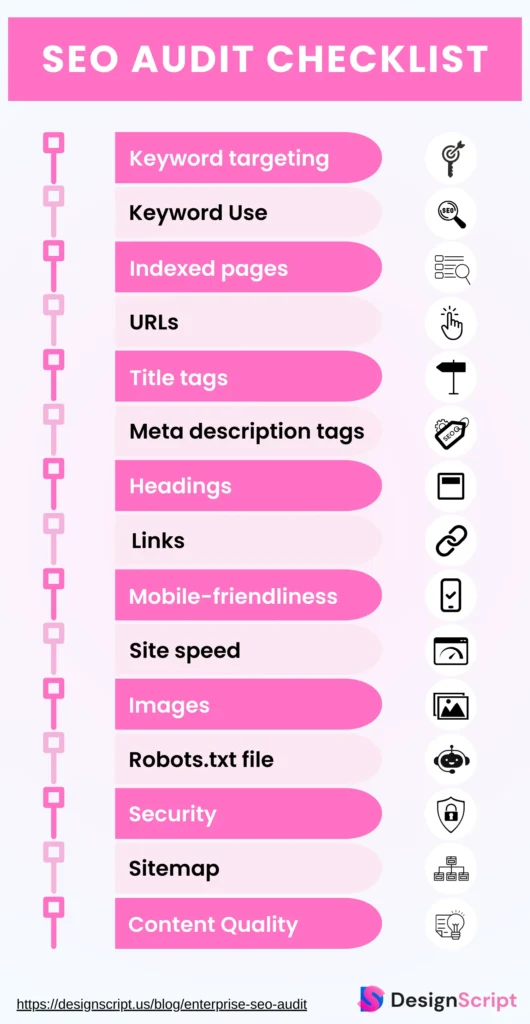Enterprise SEO Audit: Complete Guide and Checklist
Did you know organic traffic contributes over 40 percent of a website’s revenue? That’s a significant chunk! But to tap this potential, you need to understand where your website stands regarding optimization and search engine rankings. How can you achieve this? The answer lies in conducting an enterprise SEO audit.
An enterprise SEO audit is like a health checkup for your website. It helps you uncover areas where your site can perform better on search engines. Knowing your site’s SEO health is crucial whether you’re a large corporation or a small business, or else you can’t expect site growth.
If you are a beginner and don’t know about it, you don’t have to worry!
In this blog post, we’ll walk you through the process of conducting an enterprise SEO audit. We’ll explore the types, techniques, and strategies that can help you boost your site’s visibility on search engines.
So, if you’re eager to improve your website’s SEO and capture a larger share of that valuable organic traffic, read on! We’ve got you covered.
What Is An Enterprise SEO Audit?
An enterprise SEO audit is the complete assessment of the factors influencing the search engine rankings of a sizable website. It involves evaluating various aspects of your website that directly impact its search rankings and critically analyzing your overall SEO strategy.
During an enterprise SEO audit, experts look at various aspects, including technical SEO issues (like website speed and structure), duplicate content (which can hurt your rankings), and how well your site is optimized for search engines.
This audit helps large businesses, often called “enterprises,” identify areas to improve their website’s visibility on search engines. By fixing these issues, companies can enhance their online presence and attract more organic traffic, ultimately boosting their online success.
Upon completing the audit, you will receive a detailed report highlighting the SEO strategies that are performing effectively and pinpointing areas that require enhancement.
Why Is An SEO Audit Important For Large Sites?

An SEO audit is crucial for large websites for several important reasons.
1. Optimizing Content and Pages for Google Search Results
The large websites often have a vast amount of content and pages. An audit helps ensure that all these pages are properly optimized to appear in Google search results. It’s like organizing a massive library so people can find the right books easily.
2. Adapting to Google’s Changing Algorithms
Google’s search algorithms keep changing, and what worked in the past might not work now. A website audit helps large websites adapt to these changes by identifying outdated strategies and suggesting new ones, ensuring the website remains visible to its target audience.
3. Improving User Experience
Google Search Console and Core Web Vitals provide valuable insights into a website’s performance. An audit incorporates data from these tools to pinpoint issues like slow loading times or mobile-friendliness problems. Fixing these issues enhances user experience, essential for keeping visitors on the site.
4. Unifying Enterprise SEO Strategy
An enterprise SEO strategy often involves collaboration among different teams or departments. An audit brings everyone on the same page by providing a clear roadmap for SEO improvements, ensuring the entire enterprise website follows a unified and effective SEO strategy.
Thus, an enterprise SEO audit is like a regular health check for a large website, ensuring it stays competitive, user-friendly, and aligned with the ever-evolving rules of Google and the web.
How Often Should You Conduct Enterprise SEO Audits?

Regarding enterprise SEO audits, it’s important to establish a regular schedule rather than treating them as a one-time event. Monitoring your website’s performance should be ongoing, but that doesn’t mean conducting a full audit frequently.
SEO audits demand significant time and resources, so ideally, you should aim to perform one every six months. However, during the intervals between these comprehensive audits, it’s essential to have tracking mechanisms in place. These tools, such as Google Analytics, Google Search Console, SEMRush, or Ahrefs, help you closely monitor the metrics that matter to your ongoing campaigns and overall SEO strategy.
Moreover, if you undertake significant changes to your website, like a redesign, it’s advisable to carry out an additional SEO audit. It ensures that your SEO efforts align with your updated web presence, maximizing your chances of maintaining or improving your search engine rankings.
Therefore, periodic SEO audits and continuous tracking strike a balance between staying proactive and efficient in managing your enterprise’s SEO performance.
Different Types Of SEO Audits
SEO audits come in various forms, each focusing on a website’s performance to enhance its visibility and user experience in organic search results. Let’s explore the three main types:
1. Technical SEO Audit
A Technical SEO Audit delves deep into the technical aspects of a website. It examines factors like website speed, mobile-friendliness, and site architecture.
Tools such as Google’s PageSpeed Insights, Screaming Frog, or Moz can help identify issues that may hinder search engine crawlers from effectively indexing your site. This audit ensures that your website’s foundation is strong and optimized for smooth navigation and quick loading, enhancing user experience and search engine rankings.
2. On-Page SEO Audit
The On-Page SEO Audit focuses on your website’s content and individual pages. It assesses keyword usage, content quality, meta tags, and internal linking. SEO platforms like SEMRush can aid in identifying keyword optimization opportunities and content gaps. This audit aims to optimize individual pages to align with user intent and search engine algorithms, making your content more relevant and valuable to your target audience.
3. Off-Page Audit
An Off-Page Audit centers on factors external to your website, mainly backlinks and online reputation. It evaluates the quality and quantity of inbound links and examines your website’s presence on social media and other platforms. SEO tools like Moz and Majestic can assist in analyzing backlink profiles. This audit helps build a strong online reputation, an important factor in rankings of search engines and user trust.
Overall, with the aid of various SEO tools and SEO platforms, these SEO audits work collectively to ensure that your website is technically sound, offers high-quality content, and has a strong online presence. By addressing these different aspects, you can improve your website’s performance in organic search results, enhance user experience, and drive more organic traffic.
How To Conduct An Enterprise-Level SEO Audit?
Here’s a simplified guide to help you conduct an effective enterprise SEO audit:
Step 1: Create an SEO Audit Checklist

Start by building a checklist that covers essential aspects of your website’s SEO. This checklist should include items like:
- Technical SEO: Assess the website’s structure, mobile-friendliness, and page loading speed.
- On-Page SEO: Examine keyword optimization, content quality, and meta tags.
- Off-Page SEO: Evaluate backlinks, link-building strategies, and social media presence.
- Content Audit: Review the relevance and quality of existing content.
- Keyword Analysis: Identify target keywords and their search volume.
- Competitor Analysis: Analyze what your competitors are doing in terms of SEO.
- Local SEO (if applicable): Check your local listings and citations.
Step 2: Carefully Assess Each SEO Factor

Go through your checklist systematically, examining each aspect thoroughly. For technical SEO, ensure your website is error-free, loads quickly, and is mobile-responsive. Analyze keyword usage, content quality, and meta descriptions for on-page SEO. Assess the quality and quantity of backlinks for off-page SEO. When it comes to content, ensure it’s engaging and relevant to your audience. Conduct keyword research to find opportunities for optimization. Investigate your competitors’ SEO strategies to learn from their successes and failures. If your business has a local presence, ensure your listings are accurate and consistent.
Step 3: Create a Plan for Implementing Improvements Based on Audit Results

Once you’ve completed the audit, compile your findings and prioritize them based on their urgency. Develop an action plan outlining the steps to address the identified issues and improve your SEO performance. Assign responsibilities to team members, give deadlines, and establish KPIs to measure progress. This plan may include optimizing on-page content, building high-quality backlinks, resolving technical issues, and creating a content strategy aligned with your keywords.
Therefore, an enterprise SEO audit is vital to enhance your website’s visibility and performance in the digital world. By systematically evaluating various SEO factors and creating a well-structured action plan, you can pave the way for significant improvements in your online presence. Regularly reviewing and updating your SEO strategy is essential to stay competitive in today’s ever-evolving digital landscape.
SEO Audit Checklist

Let’s explore the SEO audit checklist:
1. Keyword targeting
Choosing keywords to target is a fundamental aspect of your SEO strategy. Focusing on keywords that attract valuable leads to your website during your SEO audit is vital.
Your selected keywords should include terms potential leads use when seeking information about your industry, company, products, or services. Furthermore, these keywords should exhibit sufficient search volume, indicating that many individuals are actively searching for these terms.
For enterprise-level websites, your primary focus will likely be on short-tail keywords. These keywords are more concise and general, typically comprising just a few words. While it can be more challenging to achieve high rankings for short-tail keywords, they have the potential to generate significant traffic from qualified prospects.
2. Keyword Use
In your enterprise SEO audit checklist, you must include a review of how you employ keywords on your website. This means making sure you use keywords effectively without using them too much and making your content sound weird.
It’s important to strategically include your chosen target keyword within your web page’s content. Ideally, each page should feature multiple occurrences of the target keyword, with one positioned within the initial 100 words of the content. Also, verify that your pages integrate related keywords seamlessly.
3. Indexed pages
Verifying that Google is successfully indexing your pages in your SEO audit is important. If Google fails to index a page, it will not appear in search results.
There could be various reasons behind a page not getting indexed, such as technical errors or the fact that it is relatively new and Google still needs to discover it.
Using the Index Coverage report in Google Search Console, you can assess indexing issues. If the problem lies in Google not having located your page yet, you can submit it to Google for indexing. SEO audit services often provide this service to ensure all your web content is visible to search engines.
4. URLs
Your website’s URLs are vital in conveying to search engines and users what your page is about. Google relies on them to determine where your page should rank in search results.
To ensure that your URLs are optimized for SEO, here are some key considerations to keep in mind:
- Clear Description: Craft URLs that accurately reflect your page’s content.
- Keyword Placement: Include your primary keyword, the one you aim to rank for, in the URL. It informs search engines about your page’s focus.
- Concise Length: Shorten URLs to no more than five words. Brief URLs are user and search-engine-friendly.
- Hyphen Separation: Use hyphens (-) to separate words in your URLs instead of special characters. It improves readability and SEO performance.
- Lowercase Consistency: Stick lowercase letters in your URLs to maintain uniformity and prevent confusion.
5. Title tags
Title tags serve as the titles for your web pages, offering insights to search engines and users regarding your page’s content. These titles are prominently displayed on search engine results pages (SERPs).
It’s crucial to ensure that each page on your website features a distinctive title tag that accurately conveys the page’s subject matter. The title tag should have 60 characters and include the primary keyword you’re targeting for that specific page.
6. Meta description tags
Meta descriptions are concise summaries of your webpage’s content that show up on search engine results pages (SERPs). They are vital in attracting users to click through to your page. These descriptions assist both users and search engines comprehend the essence of your page’s content. Additionally, Google occasionally utilizes them for featured snippets.
Every page within your website must have an individualized meta description that provides a brief overview of the page’s subject matter. Your meta descriptions should be 155 characters long and incorporate the primary keyword you aim to target for that page.
7. Headings
Headings play a crucial role in structuring your content and providing an overview of what your page contains.
The primary heading, known as the H1 tag, serves a similar purpose to the page title by describing the central theme of your page. However, it’s important to note that the H1 tag is visible on your page, not on search engine results pages (SERPs).
In addition to the H1 tag, consider incorporating H2s, H3s, H4s, and other header tags to organize your content effectively.
8. Links
The number of links pointing to your website plays a substantial role in determining its position in search engine rankings. A robust backlink profile consists of numerous links from different domains, particularly those with high authority. Such a profile can result in improved search rankings.
Tools like our SEO Checker, Ahrefs, and Google Search Console can help you evaluate your backlinks.
9. Mobile-friendliness
More than half of the web traffic comes from smartphones, and Google prioritizes indexing mobile website versions. Hence, your website must be mobile-friendly.
Responsive web design is an effective method for ensuring mobile-friendliness. It allows your site to adapt seamlessly to the user’s device, providing a functional and visually appealing experience whether accessed via a laptop, smartphone, or tablet.
Google’s Mobile-Friendly Test tool can help determine if a page meets mobile-friendly criteria.
10. Site speed
A slow website can give a bad user experience, with 83% of users expecting pages to load within three seconds or less. Visitors may opt for faster alternatives if your site falls short of this expectation.
It’s worth noting that Google considers page speed when determining search rankings, so a slow website can adversely impact your ranking position.
You can use our SEO Checker tool and Google’s PageSpeed Insights Tool to assess your page speed.
11. Images
Incorporating images into your content enhances its visual appeal and aids in conveying information to your visitors. Additionally, optimizing images can positively impact SEO.
For image optimization, it’s essential to use concise and descriptive filenames that may include keywords relevant to the image’s content. Hyphens should be used to separate words in filenames. For example, rather than using a vague filename like IMG_00001.jpeg, a more suitable choice would be “blue-sky-with-clouds.jpeg.”
Moreover, your images should be equipped with alt tags, which assist search engines in comprehending the content of images. These alt tags should provide a brief description of the image and can incorporate keywords if applicable. In the case of the image mentioned above, an appropriate alt tag would be “blue sky with clouds.”
12. Robots.txt file
Robots.txt files are directives for search engine crawlers, specifying which pages and files they can or cannot request from your site. As part of your enterprise SEO audit, reviewing your site’s robots.txt file is crucial to ensure it conveys the correct information to Google.
If you accidentally set up instructions that stop Google from checking a page, that page might not appear in search results. However, remember that robots.txt files are not foolproof for safeguarding sensitive information from Google. Instead, employ methods like the “no index” directive or password protection for such pages.
13. Security
A Secure Sockets Layer (SSL) certificate is essential for your website, providing the HyperText Transfer Protocol Secure (HTTPS) designation, denoted by the padlock symbol in the address bar. This security measure instills trust in users and may also positively impact your search rankings.
14. Sitemap
Incorporate the verification of an up-to-date sitemap into your enterprise SEO audit. An XML sitemap aids search engine crawlers in discovering and indexing your site’s pages. Given the extensive page count typical of enterprise sites, having a comprehensive sitemap is critical to ensure all pages are adequately indexed.
15. Content Quality
High-quality content forms the cornerstone of a successful website and is pivotal for achieving favorable rankings. Each page must offer unique and valuable content to your visitors. Pages lacking in value should be removed or updated to enhance their usefulness to your audience.
Additionally, you should either eliminate duplicate content or address it using canonical tags to address the original version of the page.
Though these are key elements to scrutinize during an enterprise-level SEO audit, they are not exhaustive, as Google considers over 200 ranking factors. Nevertheless, evaluating the above aspects provides a solid starting point for optimizing your website’s performance.
SEO Audit Tools
When enhancing your website’s visibility and performance in the digital world, conducting an enterprise SEO audit is essential. This audit process involves a comprehensive review of various aspects of your website to identify areas that need improvement. SEO professionals rely on specialized tools and services to streamline and enhance this audit process. This article will explore some essential enterprise SEO audit tools and their roles in optimizing your website.
1. Crawler Tool
Crawler tools, such as Screaming Frog and Ahrefs’ Site Audit, are like the detectives of the SEO world. They systematically crawl through your website, examining each nook and corner to unearth issues like broken links, duplicate content, and missing meta tags. These insights are crucial for the success of your SEO audit process, as they help you address technical and structural issues that may be hindering your website’s performance.
2. Backlink & Content Tools
Backlinks are a vital component of SEO. Tools like Moz and SEMrush help SEO professionals analyze their website’s backlink profile and content quality. They provide insights into the quantity and quality of links leading to your site and help identify opportunities for improvement. For enterprise SEO services, these tools are invaluable in building a strong backlink profile and optimizing content for search engines.
3. Analytics Tool
Google Analytics is a cornerstone for SEO professionals. It offers a wealth of data, allowing you to track website traffic, user behavior, and conversion rates. In the audit process, analytics tools help you understand how the audience interacts with your website, which pages perform well, and where improvements are needed. This data-driven approach is essential for making informed decisions to enhance user experience and SEO performance.
4. Google Search Console
This free tool from Google provides critical insights into your website’s presence in Google’s search results. It helps you monitor indexing status, identify search queries that lead to your site, and detect crawl errors. Google Search Console is very important for any professional enterprise SEO audit, as it directly communicates with the search giant and ensures your site is well-represented in search results.
5. Google Lighthouse
Google Lighthouse is a performance auditing tool that evaluates the speed, accessibility, and overall performance of your website. It provides valuable recommendations to improve page load times, mobile-friendliness, and accessibility compliance. As mobile optimization and site speed are increasingly critical factors in SEO, Google Lighthouse is an indispensable tool for a thorough audit process.
So, these SEO audit tools are like trusted companions for professional SEO and enterprise SEO services. They facilitate a systematic audit process, helping you uncover issues and opportunities that might otherwise go unnoticed. By harnessing the power of these tools, you can optimize your website for better search engine rankings and user experience.
Streamline Your SEO Audit with the Right Tools
As you saw, a well-executed enterprise SEO audit is your compass for online success in the ever-evolving digital landscape. The enterprise SEO audit tools, from crawlers to analytics, empower professionals and enterprise SEO services to uncover hidden opportunities and fix issues. These tools are not just aids but essential companions on your SEO journey.
Remember, SEO is a dynamic process. Regular audits ensure your website remains competitive and user-friendly, a crucial factor in ranking well. So, embrace these tools, understand your website’s strengths and weaknesses, and set out on a journey of continuous improvement. With the right tools, you’ll meet and exceed your SEO goals, driving more traffic, engagement, and conversions on your digital journey.

